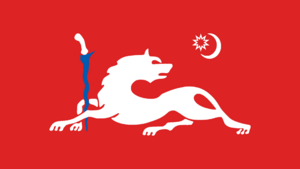Bantarangin Sunanate: Difference between revisions
No edit summary |
No edit summary |
||
| Line 1: | Line 1: | ||
{{Infobox country | |||
|conventional_long_name = Bantarangin Sunanate | |||
|native_name = ''Kasunanan Bantarangin'' <!--Country's name (usually full name) in its native language, hence in italics (double quotemarks)--> | |||
|common_name = Bantarangin | |||
|image_flag = [[File:Banner of Bantarangin Sunanate.png|thumb]] <!--e.g. Flag of country.svg--> | |||
|alt_flag = National Flag<!--alt text for flag (text shown when pointer hovers over flag)--> | |||
|image_flag2 = <!--e.g. Second-flag of country.svg--> | |||
|alt_flag2 = <!--alt text for second flag--> | |||
|image_coat = <!--e.g. Coat of arms of country.svg--> | |||
|alt_coat = <!--alt text for coat of arms--> | |||
|symbol_type = <!--emblem, seal, etc (if not a coat of arms)--> | |||
}} | |||
'''Bantarangin Sunanate''' (Hanacaraka: ꦤꦒꦫꦶꦏꦱꦸꦤꦤ꧀ꦤꦤ꧀ꦧꦤ꧀ꦠꦫꦔꦶꦤ꧀), romanization: ''Nagari Kasunanan Bantarangin'', '''Javanese pronounciation: /mbɑn:tɑrɑŋɪn/''', was an independent kingdom located in the historical region Bantarangin, in the southeast slope of Mt. Lawu. The Sunanate was established by '''Ki Ageng Mertapa Turanawangsa''', which later titled '''Hamangkuturana I''' (r. 1517-1520). It existed from the early 15th century until its dissolution in 18th century amid the Javanese War of Succession. The kingdom had played role in series of war such as Bantarangin-Demak-Pajang War, Second Geger Pakemuningan, and Javanese War of Succession along with their allies. Bantarangin reached its glorious and victorious peak during the reign of '''Hamangkuturana II''' (r. 1520-1540) and '''Pakunegara I''' (r. 1648-1679), in fact they lost their influence of power after the death of the '''Panembahan Pakunata IV''' (r. 1587-1607). They began to feel threatened by several uprisings in some nearby regions. | '''Bantarangin Sunanate''' (Hanacaraka: ꦤꦒꦫꦶꦏꦱꦸꦤꦤ꧀ꦤꦤ꧀ꦧꦤ꧀ꦠꦫꦔꦶꦤ꧀), romanization: ''Nagari Kasunanan Bantarangin'', '''Javanese pronounciation: /mbɑn:tɑrɑŋɪn/''', was an independent kingdom located in the historical region Bantarangin, in the southeast slope of Mt. Lawu. The Sunanate was established by '''Ki Ageng Mertapa Turanawangsa''', which later titled '''Hamangkuturana I''' (r. 1517-1520). It existed from the early 15th century until its dissolution in 18th century amid the Javanese War of Succession. The kingdom had played role in series of war such as Bantarangin-Demak-Pajang War, Second Geger Pakemuningan, and Javanese War of Succession along with their allies. Bantarangin reached its glorious and victorious peak during the reign of '''Hamangkuturana II''' (r. 1520-1540) and '''Pakunegara I''' (r. 1648-1679), in fact they lost their influence of power after the death of the '''Panembahan Pakunata IV''' (r. 1587-1607). They began to feel threatened by several uprisings in some nearby regions. | ||
Revision as of 14:09, 5 April 2020
Bantarangin Sunanate Kasunanan Bantarangin | |
|---|---|
|
Flag |
Bantarangin Sunanate (Hanacaraka: ꦤꦒꦫꦶꦏꦱꦸꦤꦤ꧀ꦤꦤ꧀ꦧꦤ꧀ꦠꦫꦔꦶꦤ꧀), romanization: Nagari Kasunanan Bantarangin, Javanese pronounciation: /mbɑn:tɑrɑŋɪn/, was an independent kingdom located in the historical region Bantarangin, in the southeast slope of Mt. Lawu. The Sunanate was established by Ki Ageng Mertapa Turanawangsa, which later titled Hamangkuturana I (r. 1517-1520). It existed from the early 15th century until its dissolution in 18th century amid the Javanese War of Succession. The kingdom had played role in series of war such as Bantarangin-Demak-Pajang War, Second Geger Pakemuningan, and Javanese War of Succession along with their allies. Bantarangin reached its glorious and victorious peak during the reign of Hamangkuturana II (r. 1520-1540) and Pakunegara I (r. 1648-1679), in fact they lost their influence of power after the death of the Panembahan Pakunata IV (r. 1587-1607). They began to feel threatened by several uprisings in some nearby regions.
The kingdom shares its regions and borders with another duchies, regents, and small vassalry kingdoms.
[anyone who found this, don't edit yet... it's still on work]
